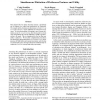Free Online Productivity Tools
i2Speak
i2Symbol
i2OCR
iTex2Img
iWeb2Print
iWeb2Shot
i2Type
iPdf2Split
iPdf2Merge
i2Bopomofo
i2Arabic
i2Style
i2Image
i2PDF
iLatex2Rtf
Sci2ools
105
click to vote
AAAI
2010
2010
Simultaneous Elicitation of Preference Features and Utility
Most frameworks for utility elicitation assume a predefined set of features over which user preferences are expressed. We consider utility elicitation in the presence of subjective or user-defined features, whose definitions are not known in advance. We treat the problem of learning a user’s feature definition as one of concept learning, but whose goal is to learn only enough about the concept definition to enable a good decision to be made. This is complicated by the fact that user utility is unknown. We describe computational procedures for identifying optimal alternatives w.r.t minimax regret in the presence of both utility and concept uncertainty; and develop several heuristic query strategies that focus simultaneously on reduction of relevant concept and utility uncertainty.
| Added | 12 Jan 2011 |
| Updated | 12 Jan 2011 |
| Type | Journal |
| Year | 2010 |
| Where | AAAI |
| Authors | Craig Boutilier, Kevin Regan, Paolo Viappiani |
Comments (0)

